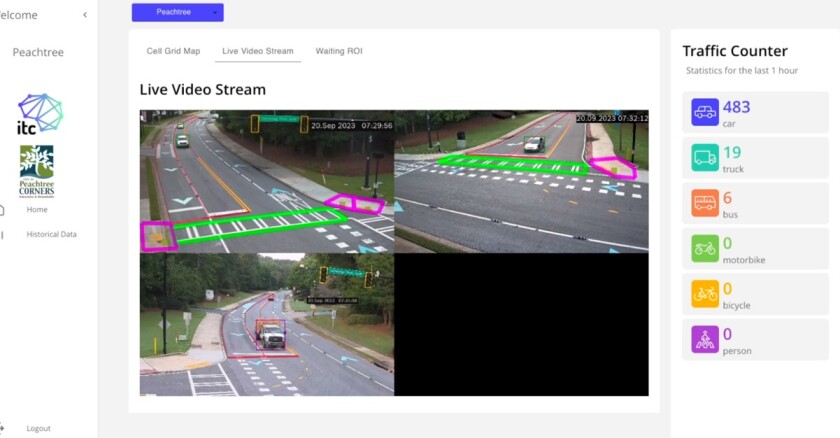Peachtree Corners is partnering with Intelligent Traffic Control (ITC), an Israeli startup, to have its technology monitor and manage traffic across a heavily traveled thoroughfare. The technology will use the city’s existing network of traffic cameras, and requires no hardware deployment.
“What really sets them apart from what we’ve seen in the past, and what we’ve worked with is, they’re using all the existing infrastructure … so not having to install a new device," said Brandon Branham, executive director of the Peachtree Corners Curiosity Lab, a city-owned testing facility for urban tech.
The ITC technology uses existing camera networks, coupled with its own computer vision analysis, to identify objects in the roadway, understand their speed and location and adjust signal timing to best manage the flow of traffic through intersections. The technology will be applied to a heavily traveled state route, affecting about 10 intersections.
Supporting the application of technology like ITC is the city’s 5G communications infrastructure, making any number of smart city technologies easier to deploy.
“You can do now with 5G what you couldn’t do before. That’s going to help a lot of cities really start to enhance and upgrade the infrastructure,” said Branham.
Peachtree Corners is not just any Atlanta suburb, but has set itself apart as a city with an openness to new forms of transportation tech like autonomous vehicles and the deployment of technology infrastructure to support it. Similarly, companies like Seoul Robotics have located its U.S. operation in the area. Meanwhile, Audi is working with technology firm Spoke Safety, which uses connected technology to communicate with cyclists, to improve the safety of vulnerable road users in Peachtree Corners.
ITC technology can already be found in cities in Israel, Australia and other locations, with Peachtree Corners serving as a launching pad for developing a U.S. market, say officials.
“That ecosystem is the perfect opportunity for us to demonstrate the effectiveness of our solution with consistent mixed traffic, public transit and pedestrian activity along the corridor,” said Aharon Brauner, ITC co-founder and CEO, in a statement.
A traffic management system based on real-time movements is a far departure from how signals have traditionally been timed, said Branham.
“Traditionally, in the transportation space, and how that corridor is managed right now, is they collect data for about eight months and then say, 'OK, go make these adjustments,'” Branham reflected. “But traffic changes every day.”








